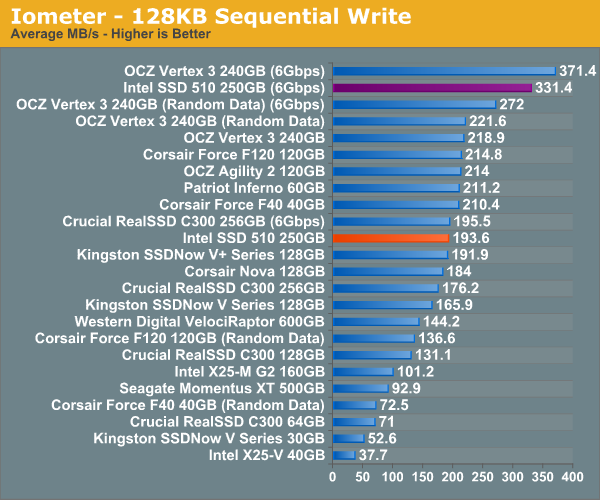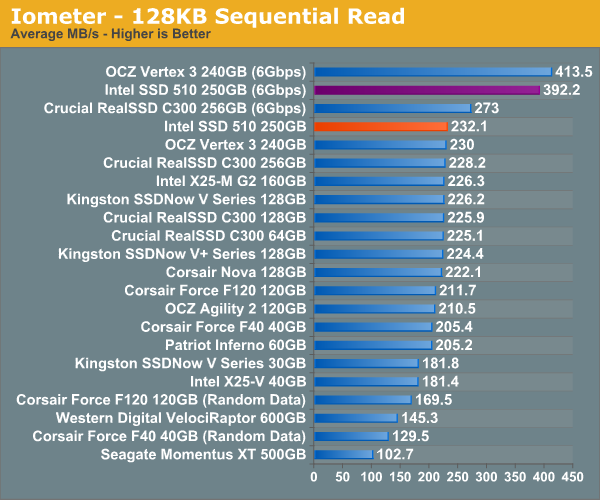The Intel SSD 510 Review
by Anand Lal Shimpi on March 2, 2011 1:23 AM EST- Posted in
- IT Computing
- Storage
- SSDs
- Intel
- Intel SSD 510
Sequential Read/Write Speed
To measure sequential performance I ran a 1 minute long 128KB sequential test over the entire span of the drive at a queue depth of 1. The results reported are in average MB/s over the entire test length.

Sequential performance is another story entirely. When paired with a good 6Gbps SATA controller (in this case the H67's 6Gbps Port 1), the 510 is only 11% slower than the best case performance of the Vertex 3. Compared to the worst case performance for the Vertex 3, Intel's SSD 510 is 22% faster.
The comparison isn't as strong over a 3Gbps interface. Bound by the SATA interface, OCZ's Vertex 3's worst case performance is actually no different than its best case performance in 3Gbps mode. As a result, the Vertex 3 is consistently 13% faster than the Intel SSD 510.

While the 510 isn't remotely competitive in random read performance, sequential read speed is within 5% of the OCZ Vertex 3 - without any real time compression/dedupe trickery. And over a 3Gbps interface the Intel SSD 510 equals OCZ's Vertex 3.










128 Comments
View All Comments
aarste - Wednesday, March 2, 2011 - link
Those graphs on the TRIM test look nothing remotely close to ATTO, which I use. I checked HDTach as well and it wasn't that, but close.What app was it?
mino - Wednesday, March 2, 2011 - link
Please, be so king and include a fast HDD (say a WD Velociraptor) in EVERY SSD benchmark.While most readers here understand the difference between SSD and HDD, including a single fast HDD would make the article useful also as a reference/datapoint when talking to not-so-techy people.
strikeback03 - Thursday, March 3, 2011 - link
Then people would complain because the numbers are so small as to be unreadablenerex - Wednesday, March 2, 2011 - link
Maybe I missed it, but i didn't see any discussion of the power usage of the new drives- according the intel press releases, the new drives use 380mW/100mW active/idle and the G2 drives only use 150mW/75mW active/idle.This means the new drives would actually be worse on laptop battery life, correct?
DigitlDrug - Saturday, March 5, 2011 - link
Hi Anand,+1
Power consumption figures would be great for us laptop users!
I find it interesting that a number of these drives report consumption of up to 3watts and others are in the mw range when browsing the Egg.
Some clarity on power consumption would be a great addition.
As always, great review!
ClagMaster - Wednesday, March 2, 2011 - link
The Intel SSD 510 is not a bad drive but it cost more than a Vertex 2 or 3.The Intel Toolbox, and extensive compatablity and reliability testing are major pluses.
The SSD is still an extravagance for desktops though I can see its a no-brainer for laptops because of power conservation. Unless the cost per gigabyte is less than $0.80/gigabyte, the performance gain does not offset the mechanical harddrive.
neotiger - Wednesday, March 2, 2011 - link
I.e., an epic FAIL product priced at a premium to competing products that are far superior.What misguided priorities from Intel. People shell out the big bucks for SSD's for their RANDOM IO performance, NOT sequential IO. So the geniuses at Intel decided to release a "next gen" product that actually has WORSE performance than the last gen product. Really?
I'm speechless. The really sad part about this fiasco is that most people will still buy this piece of crap over far superior competing products just because it's Intel.
Just like NetBurst all over again.
strikeback03 - Thursday, March 3, 2011 - link
Did you actually look at the real-world results? the 510 is almost twice as fast as the G2 160GB in some tests.poohbear - Wednesday, March 2, 2011 - link
nice review, but you're talking & comparing the Vertex 3 and this new drive, but where's the vertex 3 on the market? its not even released, its months away from release if im not mistaken? the C400 will be released before it, so what's the point of comparing tech today with tech months away from release (and in the SSD world months is a very long time!)sor - Wednesday, March 2, 2011 - link
FWIW, we've deployed literally hundreds of X25-E drives, and our failure rate is well over 1%, closer to 2%. Usually they drop link, try to renegotiate at 1.5Gbps, and fail, so it's more likely the controller than a wear-out issue.